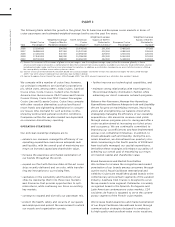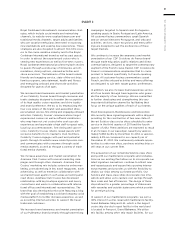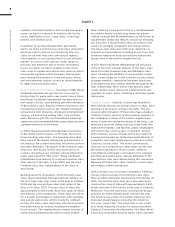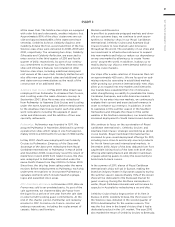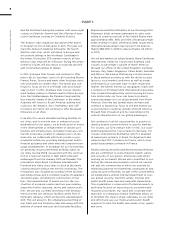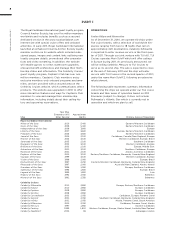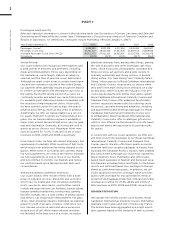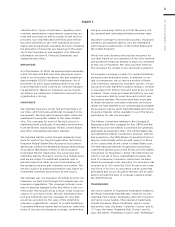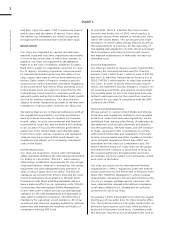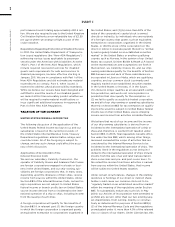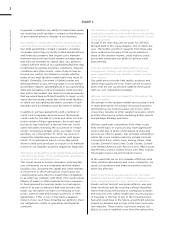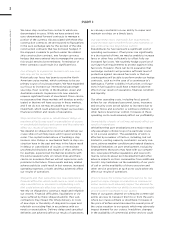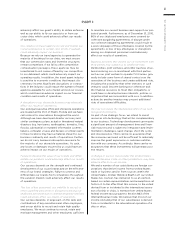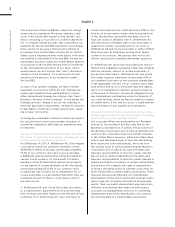Royal Caribbean Cruise Lines 2010 Annual Report Download - page 25
Download and view the complete annual report
Please find page 25 of the 2010 Royal Caribbean Cruise Lines annual report below. You can navigate through the pages in the report by either clicking on the pages listed below, or by using the keyword search tool below to find specific information within the annual report.
2010 ANNUAL REPORT 22
PART I
and their logos, the name “CDF Croisières de France”
and its logo, and the names of various cruise ships.
We believe our trademarks are widely recognized
throughout the world and have considerable value.
REGULATION
Our ships are regulated by various international,
national, state and local laws, regulations and treaties
in force in the jurisdictions in which they operate. In
addition, our ships are registered in the Bahamas,
Malta or in the case of Celebrity Xpedition, Ecuador.
Each ship is subject to regulations issued by its coun-
try of registry, including regulations issued pursuant
to international treaties governing the safety of our
ships, guests and crew as well as environmental pro-
tection. Each country of registry conducts periodic
inspections to verify compliance with these regulations
as discussed more fully below. Ships operating out of
United States ports are subject to inspection by the
United States Coast Guard for compliance with inter-
national treaties and by the United States Public Health
Service for sanitary conditions. Our ships are also
subject to similar inspections pursuant to the laws and
regulations of various other countries our ships visit.
We believe that we are in material compliance with all
the regulations applicable to our ships and that we
have all licenses necessary to conduct our business.
Health, safety, security, environmental and financial
responsibility issues are, and we believe will continue
to be, an area of focus by the relevant government
authorities in the United States and internationally.
From time to time, various regulatory and legislative
changes may be proposed that could impact our
operations and subject us to increasing compliance
costs in the future.
Safety Regulations
Our ships are required to comply with international
safety standards defined in the International Convention
for Safety of Life at Sea (“SOLAS”), which among
other things, establishes requirements for ship design,
structural features, materials, construction, life saving
equipment and safe management and operation of
ships to ensure guest and crew safety. The SOLAS
standards are revised from time to time and the most
recent modifications were phased in through 2010.
Compliance with these modified standards did not
have a material effect on our operating costs. SOLAS
incorporates the International Safety Management
Code (“ISM Code”), which provides an international
standard for the safe management and operation of
ships and for pollution prevention. The ISM Code is
mandatory for passenger vessel operators. All of our
operations and ships are regularly audited by national
authorities and maintain the required certificates of
compliance with the ISM Code.
In July 2010, the U.S. adopted the Cruise Vessel
Security and Safety Act of 2010, which applies to
passenger vessels which embark or include port stops
within the United States. This act requires the imple-
mentation of certain safety design features as well as
the establishment of practices for the reporting of
and dealing with allegations of crime. We do not expect
that compliance with these provisions will require
any material expenditures or materially increase our
operating costs.
Security Regulations
Our ships are subject to various security requirements,
including the International Ship and Port Facility
Security Code (“ISPS Code”), which is part of SOLAS,
and the U.S. Maritime Transportation Security Act of
2002 (“MTSA”), which applies to ships that operate in
U.S. ports. In order to satisfy these security require-
ments, we implement security measures, conduct ves-
sel security assessments, and develop security plans.
The security plans for all of our ships have been sub-
mitted to and approved by the respective countries
of registry for our ships in compliance with the ISPS
Code and the MTSA.
Environmental Regulations
We are subject to various United States and interna-
tional laws and regulations relating to environmental
protection. Under such laws and regulations, we are
prohibited from, among other things, discharging cer-
tain materials, such as petrochemicals and plastics,
into the waterways. We have made, and will continue
to make, capital and other expenditures to comply
with environmental laws and regulations. From time
to time, environmental and other regulators consider
more stringent regulations, which may affect our
operations and increase our compliance costs. We
believe that the impact of cruise ships on the global
environment will continue to be an area of focus by
the relevant authorities throughout the world and,
accordingly, will likely subject us to increasing compli-
ance costs in the future.
Our ships are subject to the International Maritime
Organization’s (“IMO”) regulations under the Inter na-
tional Convention for the Prevention of Pollution from
Ships (the “MARPOL Regulations”), which includes
requirements designed to prevent and minimize pollu-
tion by oil, sewage, garbage and air emissions. We
have obtained the relevant international compliance
certificates relating to oil, sewage and air pollution
prevention for all of our ships.
On January 1, 2010, a European Union directive regard-
ing the use of low sulfur fuels for ships became effec-
tive. The directive places a 0.1% sulfur content limit on
all marine fuels used by such ships while berthed or
anchored in European Union ports. Compliance with
this directive requires us to use distillate fuels such as


